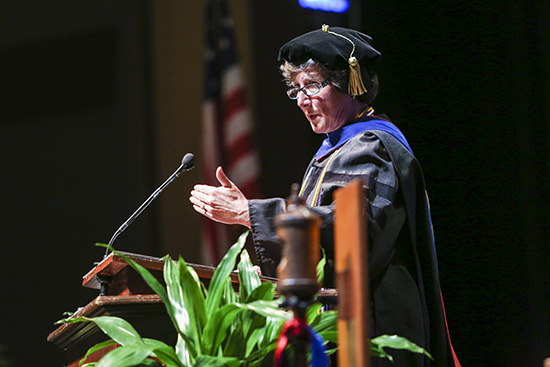
The rapidly changing health care landscape means that pharmacists today will have even more of an impact on patient care in the future, according to a leading pharmacy education professional.
Lucinda Maine, executive vice president and chief executive officer of the American Association of Colleges of Pharmacy, told spring graduates of Samford University’s McWhorter School of Pharmacy that they must be “smart and bold and passionate and entrepreneurial” in their careers.
Recalling her own career, Maine said the landscape for pharmacists is very different than when she entered practice 35 years ago. In her remarks, she referenced an opinion article she had written in 2005 about what pharmacy practice might be for the class of 2015. In those 10 years, changes with technology, Medicare and the Affordable Care Act have created opportunities for pharmacists to be more actively engaged in patient care.
“The U.S. can no longer afford health care as it has been delivered in the last century,” she said.
Systems are in place that make collaborative health care more effective, and “today’s graduates and the graduates of the future have been taught how to practice as members of patient-centered teams,” she added.
But, pharmacists will need to take the initiative, according to Maine, who is a former McWhorter School associate dean.
“The stage has been set and the opportunities on the horizon for pharmacists to assume critically important roles in patient care are simply amazing,” Maine said. “Proving that your unique medication expertise and patient care skills are essential to quality care is your utmost responsibility.”
Maine invited graduates to return with her for homecoming in 2025 to see how their careers had progressed and how pharmacy practice had changed. “The future of our profession depends on you, and it is in good hands,” she added.
The spring commencement was the first time for Samford to award new bachelor of science in pharmacy studies degrees to student who entered pharmacy school after their second year of college and had completed four full years of study. The new degrees were award to 125 graduates.
Additionally, doctor of pharmacy degrees were awarded to 123 graduates.
The May 14 pharmacy ceremony was the first of six Samford commencements over three days.
